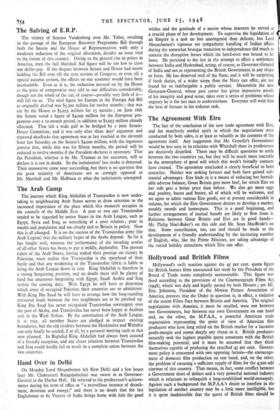The Arab Camp
The journey which King Abdullah of Transjordan is now under- taking to neighbouring Arab States serves to draw attention to the increased importance of the place which this monarch occupies in the councils of the Middle East. A year or two ago Transjordan tended to be regarded by senior States in the Arab League, such as Egypt, Syria and Iraq, as something of a poor relation ; poor in wealth and population and too closely tied to Britain in policy. Now this is all changed. It is on the success of the Transjordan army (the Arab Legion) that the military hopes of the Arabs depend. So far it has fought well, whereas the performance of the invading armies of all other States has been, to put it mildly, deplorable. The present rulers of the Arab States, having staked their prestige on victory hi Palestine, must realise that Transjordan is the spearhead of their battle and that any weakening of the Transjordan fabric is liable to bring the Arab League down in ruin. King Abdullah is therefore in a strong bargaining position, and no doubt there will be plenty of hard but courteous bargaining with Egypt, Saudi Arabia and Iraq within the coming days. With Egypt he will have to determine which areas of occupied Palestine their countries are to administer. With King Ibn Saud he will have to arrange how the long-standing territorial feuds between the two neighbours are to be patched up. King Ibn Saud has never recognised Transjordan sovereignty over the port of Akaba, and Transjordan has never been happy at Arabian rule in the Wadi Sirhan. By the constitution of the Arab League, it is true, all member States are pledged to respect existing boundaries, but the old rivalries between the Hashimites and Wahabis can only finally be settled, if at all, by a personal meeting such as that now planned. In Baghdad King Abdullah had always been assured of a friendly reception, and any closer relations between Transjordan and Iraq could hardly fail to result in a complete union between the two countries.






























 Previous page
Previous page